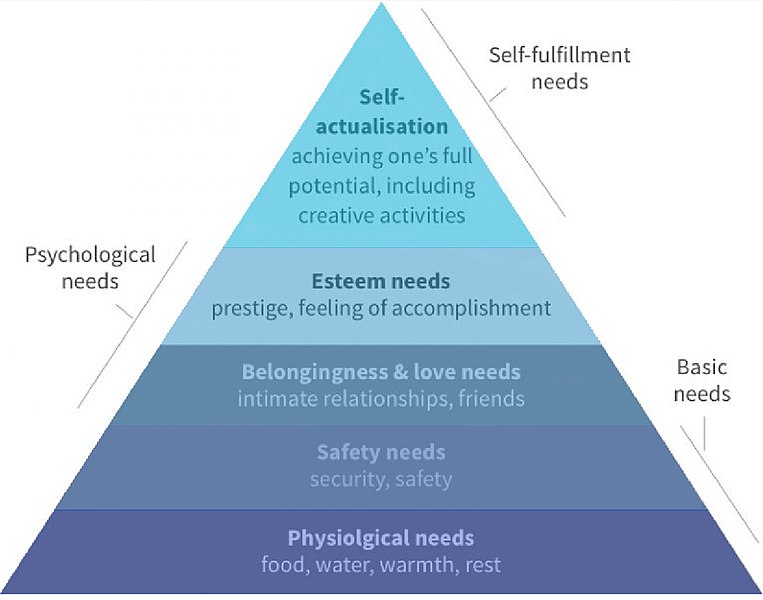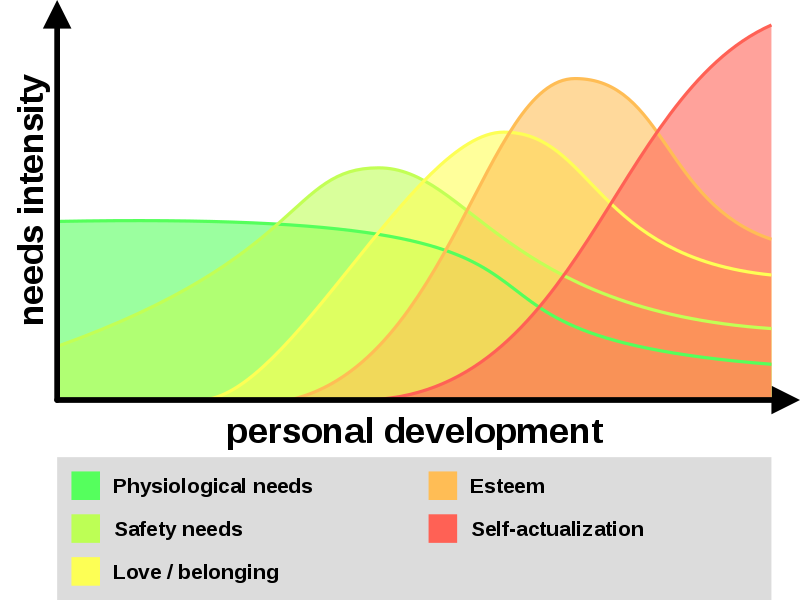Successful collaboration in the age of knowledge work, especially in agile organisations with their high degree of self-organisation and self-responsibility, depends to a large extent on the assumptions about human nature. Douglas McGregor stated as early as 1963 in his seminal book “The Human Side of Enterprise” that we should no longer regard people as lazy and reluctant to work (Theory X), but as intrinsically motivated and willing to perform (Theory Y). McGregor clearly builds on the work of Abraham Maslow, which meanwhile has become an indispensable part of management literature in the form of the hierarchy of needs named after him. However, the representation in the form of a pyramid is a misleading interpretation that Maslow did not come up with himself.
The Hierarchy of Needs

Abraham Maslow classified human needs into different categories and ranked them in his popular article “A Theory of Human Motivation” in 1943. The basis is formed by elementary physiological needs such as eating and drinking. They are followed by basic needs for physical and mental security and also basic financial security. Next come social needs such as belonging, friendship and communication, followed by individual needs including trust, recognition, status, importance, and respect from others.
According to Maslow these first four are deficiency needs, because the non-fulfilment leads on the one hand to physical or mental damage and on the other hand the overfulfilment of these needs does not bring any additional benefit after a certain degree of saturation. On the other hand, he sees self-actualization, i.e. man’s striving to unfold his talents, potentials and creativity, to develop himself further, to shape his life and to give it a purpose, as a basically insatiable need of growth.
Man is a perpetually wanting animal.
Abraham Maslow: A Theory of Human Motivation, 1943
Maslow says that these needs build on each other, but nowhere in his work does he say that the lower level needs must be met 100% before those at the next level become relevant (see this recent article or summary of it). However, this is exactly what the representation as a pyramid suggests, which is why in many seminars and books Maslow’s idea is misinterpreted in this way over and over again. And this despite the fact that Maslow himself addresses exactly this in the original article from 1943:
So far, our theoretical discussion may have given the impression that these five sets of needs are somehow in a step-wise, all-or-none relationship to each other. We have spoken in such terms as the following: ‚If one need is satisfied, then another emerges.‘ This statement might give the false impression that a need must be satisfied 100 per cent before the next need emerges.
Abraham Maslow: A Theory of Human Motivation, 1943
The somewhat static representation of these needs as a pyramid simply does not reflect the complexity and dynamics of human needs. It is an unacceptable simplification, which has unfortunately become widespread despite or precisely because of this. In fact, all needs are present simultaneously with varying intensity.
Value Creation Through Appreciation
Admittedly one can still believe that organizations and especially companies in the free markets do not have to feel responsible for all these individual needs. No one would say it as clearly today as Henry Ford, who only wished for human labor and grumpyly accepted the rest (“Why is it every time I ask for a pair of hands, they come with a brain attached?”), but in most organizations at most the level of the individual needs such as trust, esteem, self-affirmation, success, freedom and independence is reached.

In many places, however, these spheres cannot be reached at all. Usually you can consider yourself lucky if at least the social needs are satisfied by nice colleagues and good teamwork. But through harmful evaluation and incentive systems, which aim more at individual competition than at cooperation, sometimes not even that is given and thus it’s just a job to pay off the house. No wonder people are not motivated and must be stimulated to perform with increasingly sophisticated incentive systems.
Without people there is no economy. Consequently, people are always ends and the economy only means – not vice versa.
Götz W. Werner
The results of this mindset are well known and can be seen year after year, for example, in the Gallup Engagement Index. In 2018, 71% of employees in German companies worked by the book, 14% even resigned internally and only 15% really put their heart and soul into their work. If you follow Maslow’s description of human needs and McGregor’s concept of man based on it, then the reason is not so much people as the way we have built organisations. Or to put it another way: Whoever builds organizations like machines and uses (and wears out) people like gears in them can at best expect work by the book.
I can assure you that there is a place where your employees are creative, but that place may not be their workplace.
Gary Hamel: The Future of Management.
The employees then seek the satisfaction of their unfulfilled needs outside their workplace, in their families, in associations, in hobbies and much more. This, however, means that an incredible amount of individual potential is lost for the organisation. It would therefore certainly pay off to offer employees the opportunity to develop their potential and ultimately their self-actualization within their working hours. A good starting point for this would be to question the prevailing concept of man and, building on this, to design a suitable framework in which people can unleash their potential. This dream of a more humane working world continues to haunt me and that is exactly why the Manifesto for Human(e) Leadership (also available in German as paperback at Amazon or as e‑book in English on Leanpub) is so important to me.





